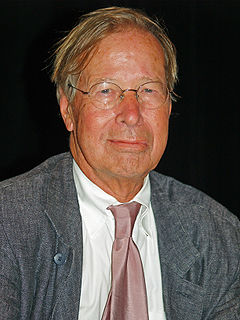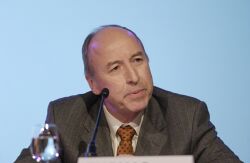Bradley C. S. Watson is a Canadian-born American political science educator, lawyer, and writer, and a member of the “West Coast Straussian” [1] school of political thought.
He is professor of politics at Saint Vincent College in Latrobe, Pennsylvania, where he holds the Philip M. McKenna Chair in American and Western Political Thought. He is co-director of the college’s Center for Political and Economic Thought, a public policy educational and research institute dedicated to advancing “scholarship on philosophical and policy concerns related to freedom and Western civilization with particular regard to the American experience.” [2] He has held visiting faculty appointments at Princeton University and Claremont McKenna College. He is a fellow of several think tanks, and a Senior Scholar at the Intercollegiate Studies Institute. [3]
He was born in Toronto and educated in Canada, Belgium, and the United States, earning a B.A. from the University of British Columbia in Vancouver, a J.D. from Queen's University Faculty of Law in Kingston, Ontario, an M.Phil. from the Institute of Philosophy, University of Leuven (Louvain), Belgium, and an M.A. and Ph.D. from the Claremont Graduate University in California. [4]

The University of British Columbia (UBC) is a public research university with campuses in Vancouver and Kelowna, British Columbia. Established in 1908, UBC is British Columbia's oldest university. The university is ranked among the top 20 public universities worldwide and among the top three in Canada. With an annual research budget of $600 million, UBC funds over 8,000 projects a year.

Vancouver is a coastal seaport city in western Canada, located in the Lower Mainland region of British Columbia. As the most populous city in the province, the 2016 census recorded 631,486 people in the city, up from 603,502 in 2011. The Greater Vancouver area had a population of 2,463,431 in 2016, making it the third-largest metropolitan area in Canada. Vancouver has the highest population density in Canada with over 5,400 people per square kilometre, which makes it the fifth-most densely populated city with over 250,000 residents in North America behind New York City, Guadalajara, San Francisco, and Mexico City according to the 2011 census. Vancouver is one of the most ethnically and linguistically diverse cities in Canada according to that census; 52% of its residents have a first language other than English. Roughly 30% of the city's inhabitants are of Chinese heritage. Vancouver is classed as a Beta global city.

The Queen's University Faculty of Law is a professional faculty of Queen's University in Kingston, Ontario, Canada and is regarded as one of the most prestigious institutions of legal education in Canada. According to the 2013 Maclean's Magazine Law School Rankings, Queen’s is tied for third among law schools in Canada.
His publications concentrate on several themes: the unfolding of the liberal idea in the modern world, particularly through courts of law; [5] the problems and prospects of higher education, particularly civic education, in liberal societies; [6] and the strengths and weaknesses of the West in the face of an illiberal foe—Islamism. [7]
Watson is a critic of American progressivism. He has appeared on the Glenn Beck television program to discuss his book Living Constitution, Dying Faith: Progressivism and the New Science of Jurisprudence. [8] He has argued that the idea of a “living constitution,” which he traces largely to social Darwinism and pragmatism, [9] undermines the American founders’ Constitution dedicated to fixed natural truths, and is a slippery slope toward moral and political nihilism [10] He has also been critical of both legal positivism and the deontological liberalism of John Rawls, arguing that they fail to provide a stable foundation for constitutional interpretation, [11] and of same-sex marriage, arguing that it is antithetical to moral realism and essentialism. [12]
Although West Coast Straussianism is usually understood to be a version of political conservatism, [13] Watson has been attacked from various points on the conservative spectrum, including by Harry V. Jaffa, the acknowledged founder of the West Coast Straussians. [14] Jaffa has suggested that Watson is insufficiently critical of the legal positivism of conservative Judge Robert H. Bork, [15] while others have suggested he is too critical. [16] Meanwhile, traditionalist conservatives have denied Watson’s claim that universal philosophical principles played an important role in the American founding. [17]
Watson has defended both natural rights philosophy and cultural traditions as essential elements of the American experience, and of a complete understanding of the U.S. Constitution. [18]










